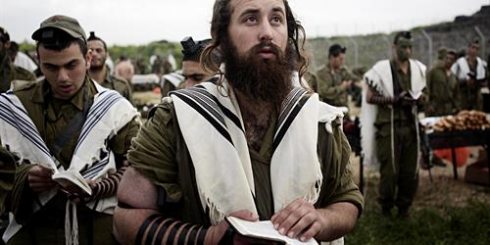Haredi Integration: Not by Re-Education
In an op-ed in The Marker, Attorney Haim Zicherman warns against attempts to integrate ultra-Orthodox Jews into the army and the workforce by encouraging them to abandon their lifestyle, and calls for developing mechanisms that will accept and respect their values.

The third generation of Israel's ultra-Orthodox community has reached a breaking point, both internally and externally. Internally, the pressure within the Haredi community is increasing. A life of exclusive Torah study that dooms the entire family to poverty and asceticism is not appropriate for everyone; however, most Haredi men are trapped in a framework that does not allow them to leave. They do not have life skills, do not speak modern Israeli Hebrew, and if they enter the Israeli public domain they will be separated from the accepted norm of their community.
Externally, secular society in Israel is no longer willing to accept the behavior of the ultra-Orthodox. The demand for equal sharing of the burden of military service is just a symptom of secular society's opposition to the isolationism of the Haredi community—a community that does not follow the Israeli rules of the game. For the first time in three generations, the ultra-Orthodox leadership finds itself flanked on both sides, caught in a pincer movement between internal and external forces. Change is imperative.
And change is indeed taking place. The halls of academia are full of Haredi men and women, studying—in separate classrooms—Berlin and Kant, Gauss and Pythagoras. The specialized tracks for Haredim in the military and civilian service are similarly full of yeshiva students dressed in uniforms, who make their way to their jobs every day, doing the bidding of the state.
But the ultra-Orthodox street, on both the individual and collective levels, feels threatened by the current government and the nature of the current discourse. The many core issues on the agenda, the change in the status quo, and the harm that is being done to the educational system—which the Haredi community holds dear—are piercing the heart of the community. Although the school budget cuts that have been announced are painful, they are seen as necessary and reversible, rather than as a war on religion. The demand that the ultra-Orthodox community change its lifestyle and worldview, in contrast, touches a raw nerve and elicits a reflexive withdrawal.
The Haredi citizens of Israel cannot escape the feeling that society's demand for integration is simply masking a demand for the re-education of Haredi society, and is part of an attempt to make one part of the ultra-Orthodox community change its way of life such that those who cling to their lifestyle become non-normative (culturally, legally, and socially).
An example of this attack on the Haredi lifestyle can be found in the discourse calling for a ban on gender segregation in Haredi schools, which should not be confused with the legitimate discourse that seeks to prevent exclusion and degradation. It must be noted that the established norm in the ultra-Orthodox community is to separate boys and girls completely. A young Haredi man will not engage in small talk with a woman who is outside of his circle of seven closest relatives, unless it is his grandmother. This is not an act of exclusion; rather, it is a form of separation that is based on a strict interpretation of Jewish law. The demand to prevent gender segregation on the grounds that it excludes and demeans women is mistaken. It seeks to impose a permissive Western lifestyle on a community that advocates extreme conservatism, and thus attempts to mix two incompatible types.
Is it indeed important to maintain gender segregation frameworks such as the military and institutions of higher education that bring the Haredi world and general Israeli society into contact? This is a significant question that requires a deep understanding of ultra-Orthodox culture and Jewish law. It is regrettable that the Attorney General adopted the recommendations of a report on this matter when the authors of the report—and the Attorney General himself—did not hear the ultra-Orthodox position. It is also unfortunate that academics have been expressing their opposition to segregation on the basis of gender in educational institutions without distinguishing between segregation that is permissible and segregation that is forbidden.
The integration of the ultra-Orthodox into the Israeli economy can only be accomplished by creating a climate that is favorable to integration. It will not be achieved in ways that are opposed to the Haredi lifestyle and without a dialogue of acceptance. The demand to integrate the Haredi population into Israeli society requires significant concessions not only on the part of the ultra-Orthodox, but also on the Israeli side. It requires openness rather than arrogance, and inclusiveness rather than divisiveness. The patronizing attitude that seeks to re-educate Haredim and correct their lifestyle must be abandoned. Instead, tools must be developed to integrate the ultra-Orthodox into Israeli society while accepting and respecting their differences.
Attorney Haim Zicherman is a researcher conducting research as part of IDI's Religion and State project and is an instructor at Ono Academic College and Sha'arei Mishpat College of Legal Studies. In 2012, he served as the content manager of the Committee for the Advancement of Equality in the Burden (the "Plesner Committee"), which was tasked with proposing a solution for the issue of the Haredi draft.
A version of this article was published in Hebrew in The Marker on July 8, 2013.
Read the proposal by Prof. Yedidia Z. Stern and Attorney Haim Zicherman on the Haredi draft.
- Tags:
- Haredi Conscription,
- Religion and State,
- Right to Equality,
- Ultra-Orthodox,
- Human Rights,
- Conditional partnership,
- Civil Liberties,
- Equal Sharing of the Burden,
- IDF service,
- Religious-Secular Relations,
- ultra-Orthodox/Haredi,
- Israeli society,
- equality,
- religion and state,
- Religion and State Program
